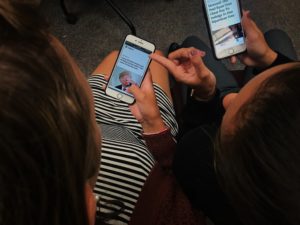Column: The dangers of false information in the hands of Gen Alpha
by Katherine Desmond
I’m seventeen, and seeing kids younger than myself absorbed in social media is terrifying. It’s not because they’re too young to use it, but because they’re too young to know what’s real and what’s fake.
False information is consuming our media and we’re constantly hearing about fake news.
I have a younger brother, and he is on social media as much as five hours a day. He will ask me if I have heard about something that he read about on Twitter or Instagram or on a Snapchat news page. It doesn’t take much explaining from him for me to realize that much of the information that he’s seeing is distorted, exaggerated, or just plain false.
Seeing up close the effect that this information has had on a young kid really took me by surprise. I never realized how easy it is for younger kids to believe everything they read.
My brother is part of Gen Alpha, the generation of kids born between 2010 and 2025. They are too young to tell what is credible and what is not.
My age group did not embrace social media until our early teens. By the time we started using social media for our news, we were at the age where we could better identify information that did not seem credible and fact-check it. I am worried that Gen Alpha believes everything they see.
We are already in an age of fake news. If Gen Alpha cannot identify false information, they are going to grow up believing everything they see and hear.
There is no easy solution. Trying to keep Gen Alpha off of social media entirely until they’re older is never going to work, and trying to train 8 year olds to fact check all of the information they take in is not going to happen either. We have to keep telling them that not everything they read is true.
I have been doing that with my brother, and I can see that it’s working. Even though he is young, he can identify signs that information could be fake. This shows me that the future for Gen Alpha doesn’t have to be terrifying.

Socialize